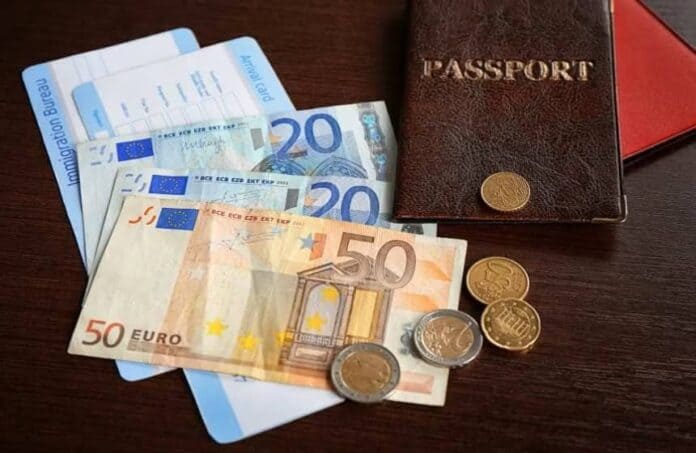International trips are sure fun, but there are some rules and regulations to follow when it comes to actually realising your dreams. This includes how much money you can carry to a country from India. Indians can freely remit up to $250,000 (around Rs 1.80 crore) per financial year for any permissible transactions, according to the Reserve Bank of India’s Liberalized Remittance Scheme (LRS).
Travellers can only carry foreign currency notes or coins for a maximum of $3,000 per visit, according to the RBI. In addition to cash, you can use store value cards, traveler’s checks, or bank drafts to carry the remaining cash when you travel abroad. This is only applicable for tourists who are going abroad for a short period of time.
If you are going on the Umrah/Hajj pilgrimage, you can use all of your entitlement up to $250,000 in cash or its equivalent for each visit. This has been permitted by the Haj Committee of India.
Many countries around the world impose restrictions on the amount of cash travellers can carry while journeying abroad. These limitations are typically put in place to regulate currency flow, prevent illicit activities such as money laundering and terrorist financing, and maintain the integrity of financial systems. While the specifics of these limits vary from one destination to another, travellers are often required to declare amounts exceeding certain thresholds upon entry.
France
Travellers visiting France must adhere to regulations regarding the amount of cash they can carry into the country. Any sum less than EUR 10,000 can be brought in without the need for declaration. However, amounts exceeding this threshold must be declared upon entry to ensure transparency in financial transactions.
Spain
Similar to France, Spain permits travellers to carry less than EUR 10,000 without declaration. This measure is designed to facilitate smooth entry for tourists and business visitors while maintaining oversight of large cash movements to prevent financial irregularities.
Italy
Italy imposes a restriction on the amount of cash travellers can bring into the country without declaration. Like other European destinations, the limit is set at less than EUR 10,000. Amounts surpassing this threshold must be declared to customs authorities to ensure compliance with financial regulations.
United States
For travellers from India to the United States, the legal limit for liquid cash is set at USD 3,000 per person per trip. Amount greater than this can be carried in the form of travellers’ cheque, Forex Card or bank transfers. This measure is aimed at preventing illegal financial activities and ensuring transparency in cross-border transactions.
Canada
Upon entry into Canada, travellers carrying CAN 10,000 or more in Canadian dollars or foreign currencies must declare the amount to border security officers. This requirement helps authorities monitor large cash movements and prevent potential illicit activities such as money laundering or financing of criminal enterprises.
Thailand
Thailand imposes restrictions on the amount of cash travellers can bring into the country to maintain financial stability and prevent illicit activities. The maximum allowable amount is THB 50,000, with minimum thresholds set at THB 10,000 per person or THB 20,000 per family.
United Kingdom
In the United Kingdom, both individual and group travellers are subject to a cash limit of GBP 10,000 pounds. Amounts exceeding this threshold must be declared upon entry to ensure compliance with financial regulations and prevent unauthorised cash movements.
Greece
Travellers to Greece must adhere to regulations regarding the amount of cash they can carry into the country. The limit for liquid cash is set at EUR 10,000, with amounts exceeding this threshold subject to declaration to ensure transparency in financial transactions.
Germany
The limit for liquid cash for those travelling to Germany is set at less than EUR 10,000, with any excess amount requiring declaration to customs authorities.
Australia
Australia imposes restrictions on the amount of cash travellers can bring into the country to prevent money laundering and illicit financial activities. Amounts less than AUD 10,000 do not require declaration upon entry.
Nepal
Indian travellers visiting Nepal are subject to restrictions on the amount of cash they can carry, set at INR 25,000. Additionally, currency notes with denominations exceeding INR 100 are not allowed to be brought into the country to prevent counterfeit currency circulation.
Singapore
Singapore imposes restrictions on the amount of cash travellers can bring into the country to maintain financial stability and prevent money laundering. The limit is set at SGD 20,000, applicable to both cash and alternative forms of payment.
Bhutan
While Indian currency is widely accepted in Bhutan, travellers are prohibited from carrying notes with denominations of 500 and above to prevent currency-related issues and ensure smooth financial transactions within the country.
Mauritius
The preferred currency in Mauritius is the Mauritian Rupee (MUR). Travellers are permitted to carry less than MUR 500,000 into the country without the need for declaration, facilitating smooth financial transactions for tourists and business visitors.
Dubai
Dubai imposes restrictions on the amount of cash travellers can carry into the country to prevent illicit financial activities. The limit is set at UAE Dirham 100,000, with amounts exceeding this threshold subject to declaration.
Indonesia
Travellers to Indonesia must adhere to regulations regarding the amount of cash they can bring into the country. The limit for unreported cash is set at less than IDR 1 billion to prevent financial crimes and maintain transparency in cross-border transactions.
Sri Lanka
Sri Lanka imposes restrictions on the amount of cash travellers can bring into the country to prevent illicit financial activities. The limit is set at USD 10,000, applicable to both cash and alternative forms of payment. Compliance with these regulations ensures transparency and integrity in financial transactions within the country.
FAQ
Q1: How much cash can you carry on a plane?
Answer: You can carry the amount prescribed by RBI, else they may impose a penalty if you don’t. However, if the value of the foreign currency in cash exceeds US$ 5,000 or the cash plus TCs exceeds US$ 10,000, then it should be declared to the authorities at the airport in the Currency Declaration Form (CDF) after returning to India.
Q2: Can airport security detect money?
Answer: Airport scanners cannot detect money. However, deployed officers can check it.
Q3: Where is the safest place to keep cash?
Answer: You can secure cash in purses and wallets and keep them separately.






















